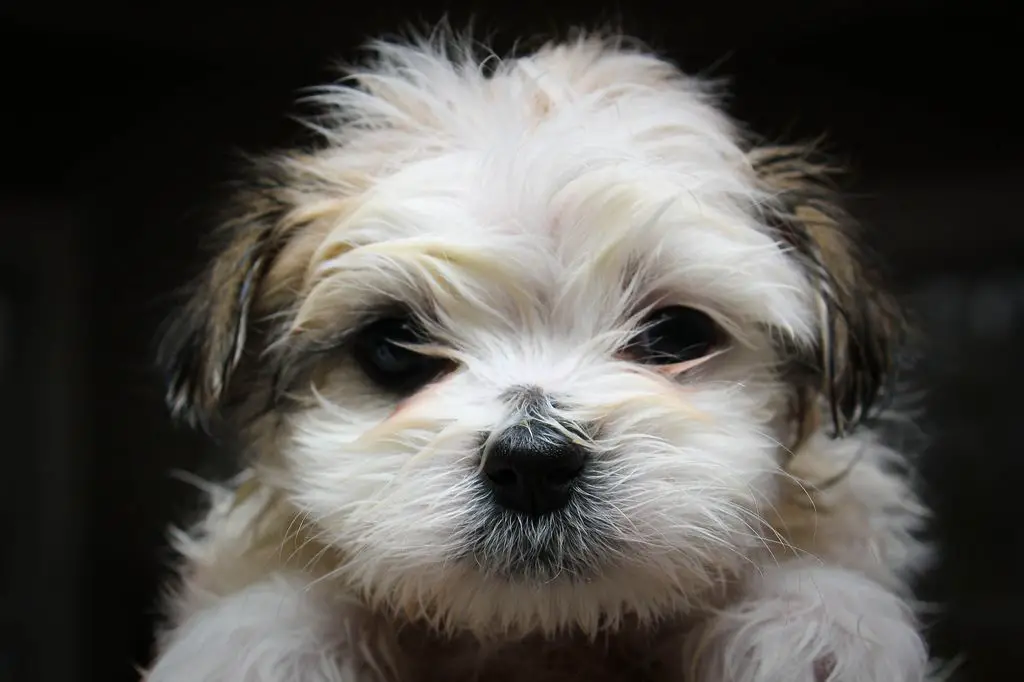Shih Tzu is an overall clean breed. However, the house potty training process sometimes cannot be rushed. It is best to train the Shih Tzu properly at the very early puppyhood than to retrain the dog.
Do you have a specific question about house training your Shih Tzu? Then use the table of contents below to jump to the most relevant section. And you can always go back by clicking on the black arrow in the right bottom corner of the page. Also, please note that some of the links in this article may be affiliate links. For more details, check the Disclosure section at the bottom of the page.
Here's what we'll cover:

Shih Tzu and breed’s origin
Shih Tzu (or even more appropriately, Shih Tzu Kou) literally means “lion dog.” And it describes one of the most esteemed pets in China because of its connection with Buddhism. And though the Shih Tzu is often linked with China, there are some proofs that it presumably started in Tibet as early as the 17th century. There it was known as a “holy dog.” The Shih Tzu, as it is known today, emerged most distinctively in China through the reign of Dowager Cixi (Tz’u-shi, 1861 – 1908) Empress.
The Shih Tzu was a house pet of choice during the Ming Dynasty and was appreciated by the royals. When the British invaded the Imperial Palace, the breed suffered a significant setback. In the United States, it began to gain popularity in the 1960s. After that AKC finally recognized it in 1969.
Despite its tiny size, the Shih Tzu needs regular activity, including dynamic indoor games or brief walks outside. The Shih Tzu doesn’t appreciate the humid weather, and it should never be kept outdoors. Its fur demands daily brushing; and therefore Shih Tzu pups should be taught to allow grooming from its first days.
You might also like:
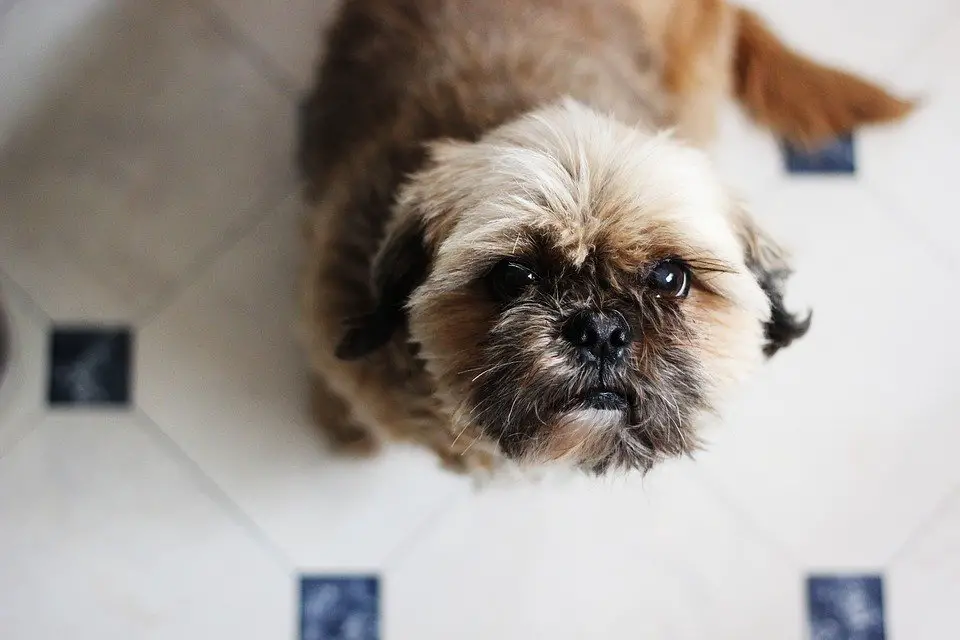
Shih Tzu Potty Training: Basic Concepts To Learn (+ Infographic). Read more.

How to potty train a Shih Tzu
The major steps of shih tzu potty training are the following:
- Observe
- Choose the training method and command
- Plan the schedule
- Proceed with the training
- Communicate with your Shih Tzu

Potty training Shih Tzu puppies
The potty training outline for shih tzu puppies looks precisely the same as the plan for a grown dog. You have to follow and take notes of your pup behavior, pick the training method that works best for you and the pet, create the schedule, and start the training.
The only difference is taking into consideration shih tzu’s age. Once your puppy turns 2 months, he or she is capable of holding liquids in for a couple of hours. And that’s when it makes sense to start the potty training process.
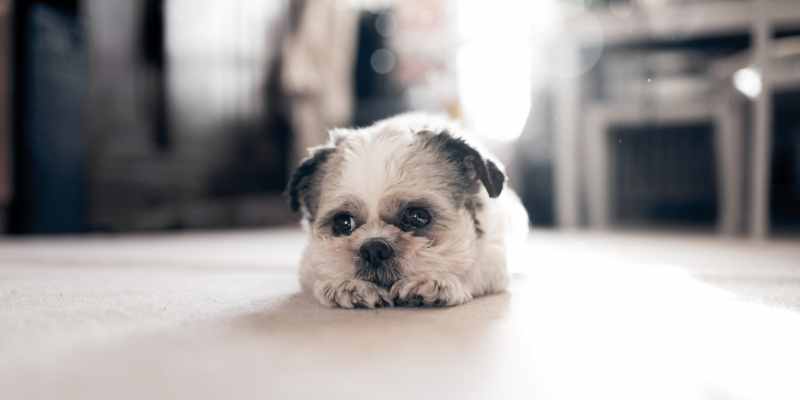

How to potty train a Shih Tzu: Approach
Step 1. Observe your pet
For the training to be successful, the most critical thing that a new master must learn to keep an eye on their pup. That does not seem very difficult; after all, what is more entertaining to watch than a new pet!
Puppies exhibit telltale signs that they are eager to eliminate. To do the proper Shih Tzu housebreaking, you have to notice and decode their body language, including circling, squatting and sniffing.
Step 2. Choose the training method and command for Shih Tzu house training
First, choose where and what you want the puppy’s toilet to be. Should it be the puppy pads (for instance pads by American Kennel Club that can be purchased on Amazon) or even a litter box (great option , various sizes) which is helpful for those who live in smaller places like condos and do not have a prompt and direct way to the outdoors?
Whichever you choose, it is essential to be consistent; otherwise, you’ll confuse your pet.
Secondly, it is crucial to use the words that the animal will understand. Just as we repeat the word, “sit,” we also must use a word for potty. Decide in advance what would it be (maybe, “go potty” or “do your business”?). And don’t forget to check our list of seven secret hacks for successful Shih Tzu puppy training.
Step 3. Plan the schedule
Scheduling is essential in Shih Tzu housebreaking. Young dogs will usually want to eliminate after eating, playing or drinking or upon awakening. And about every 2 hours all the other time.
Arrange your agenda so that you will surely have a slot to train your dog, at least a weekend of continuous indoors training! Daily feeding plans will help to streamline the process of training.
While it is convenient to give food at any time you; regular mealtimes are better for putting the puppy on a schedule. Water has to be available at all times.
At first, you might also discover that night is a real nightmare for the training as pups can’t hold it all the time. That means waking up in the middle of the night to check on your puppy’s business. You might be able to modify this behavior to some degree adjusting the feeding schedule and making your puppy potty several times before bedtime. But it still will be challenging.
Step 4. Proceed with the training
Watch the pup like a hawk for signs (arch back, sniff around, circle) and use your chosen word to make the potty happen. Treat the pup after the successful accomplishment of the procedure.
If the dog doesn’t go after 10 minutes, put him in the designed potty space for about 15 minutes. Command, and Reward to Reinforce principle can be used to teach your pet to do whatever you want as it created for the fastest canine education process. The dog wants to repeat any action that causes a favorable result – in our case, potty in the right place brings a nice reward.
Punishing dogs on the contrary only serve to make the pet stressed and anxious (which may lead to potty accidents). Dogs, as far as scientists are concerned, do not feel mixed emotions like guilt. So when people declare that their dog looks “guilty” they are seeing anxiety. The dog sees an annoyed owner and pets body language shifts into fear, not guilt.
Step 5. Communicate with your Shih Tzu
The Shih Tzu that is trying to speak to you will reveal a few primary signals. If you were another dog owner, then you would pick those up immediately. And if you are new to this we recommend checking guide on pets’ body language.
When a dog is not totally happy, such as when he must to go outside to potty yet only has a hazy idea that this is what you need from him, he will start to grow a little concerned. This anxiety can be manifested in your Shih Tzu ’s behavior in many ways. For instance, your pet will lick lips.
Another sign to look for: your dog will look right in your eyes and immediately glance away, then look at you again. Looking away is another self-calming signal.
Randomly sniffing the floor, is a sure sign that a Shih Tzu is about to squat. Get him to the designated potty area ASAP.
The yawning Shih Tzu is also often an anxious and tired pet. You might look up for this sign during the training sessions.
You might also like:
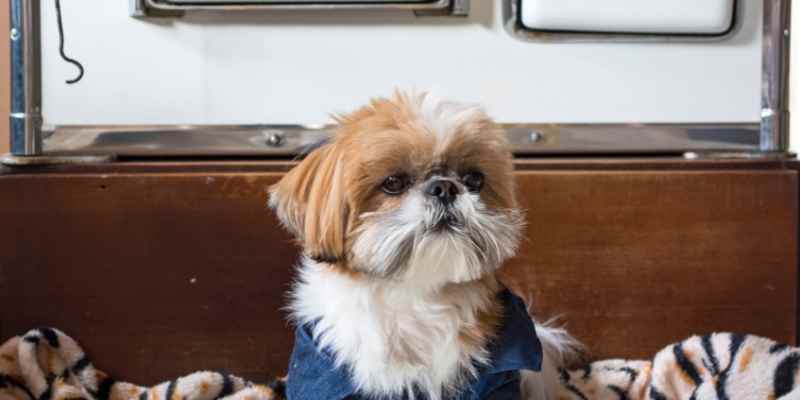
7 Secret Hacks of Shih Tzu Puppy Training. Read More.

Shih Tzu training problems
Sometimes potty training with dogs is more complicated. Housebreaking can go awry for a few reasons other than lack of suitable training and there are some things to look out for with your own Shih Tzu. Among the most common shih tzu potty training problems are boredom, health issues, anxiety, dog personality and even bad previous experience. Let’s cover all in the details.
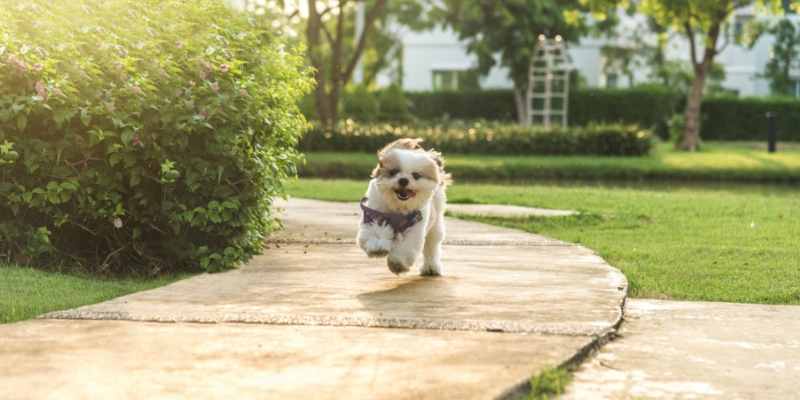
Boredom
If after the training your Shih Tzu continues to do their business in the wrong places the most probable reason that some people overlook is boredom. When bored Shih Tzus drink large amounts of water. Therefore must go pee more frequently than you can even imagine. If you notice that your dog drinks more than usual ensure that you take him to the potty area more often. Also, come up with the solution to eliminate boredom – think of more for your pet to play with.
Boredom is the key cause of many behavior problems for this breed, not only potty training issues. Chewing, for instance, can be also caused by it.
Bad previous training
Other problems with potty training can happen when the pet wasn’t properly introduced to the crate. In some cases, dogs can feel about it as a punishment. In that situation your Shih Tzu may show signs of anxiety, they may whine and bark or chew things. They need to feel safe in a and think of it as their special place, not a cage.
Health issues, psychological problems, and hormones can also cause troubles with house training your Shih Tzu. It the dog is old, for instance, his muscles are getting weak, so they might not hold on like they used to.
Illness can also be the cause of bad potty habits. If your pet is needing to do the potty more often than usual, maybe there’s a place for a urine infection, which has to be cured with antibiotics, to prevent the further development of the disease.
Shih Tzu’s personality
When a dog is anxious, stressed or nervous, then his training may also go wrong. Reasons behind the stress might be: lack of self-confidence, separation anxiety, need for more socialization or fear.
If your Shih Tzu is not successful enough with potty training because of the stress factors you can easily spot it as there should be other signs of that: e.g. barking is the sign of separation anxiety, growling – uncovers low-confidence. But since all dogs have their personality you need some time and experience if you want to learn how to spot it and know exactly what your dog feels. If you want to learn more about the breed personality book is an ABSOLUTE must-have. It covers all behavioral troubles and breed’s quirks you may encounter and way more than that. A very wholesome reference book for any Shih Tzu owner who is striving to understand his pet.
You might also like:

Accidents and Submissive Urination
Various reasons can cause accidents, and some actions might be needed to fix those. At first, expect mishaps and be certain to have lots of cleaning materials around. The best way to manage accidents is not to exaggerate. The old methods of beating a dog or rubbing his nose in the slip area are not only inhumane but also useless.
If you can get your puppy during the act, say something like, “whoops”, and take him to the designed potty area. If he accomplishes the mission accurately – praise him and give him a treat.
Clean up any accidents with a pet enzyme cleaner (e.g. one, that “makes wonders” as users reported. It destroys the odor right away and, then the more you work at it, this will get even OLD urine stains out)
Some puppies and adults will squat and urinate when they engage with new people. While this is a standard canine signal of submission, people don’t respond to this display in quite the same way that an alpha dog might. Most dogs outgrow this attitude, but some won’t. Scolding the dog, in this case, will make the dog urinate more. Here are a couple of suggestions on how to fix this:
- Walk aside from the dog when you are meeting him
- Wait until he quiets down before touching him
- Pet him under his chin or a chest, but not on his head.
- Crouch down or stand aside while you are petting him in this situation.
Health issues (including diarrhea)
Old age and infections can provoke potty problems.
Aging causes the weakening of the muscles, and the older dog may not be able to hold on like before.
Illness can be the cause of lousy potty habits.
Diarrhea can ruin any well-planned housebreaking system. Getting it under control is the first task. To resolve the issue first, you have to figure out what caused diarrhea. Amongst the reasons might be the change in diet, intestinal parasites, bacterial infections, etc.
Psychological Issues
When a dog is stressed or nervous, then the training may also be jeopardized. Amongst the reasons for anxiety are lack of confidence, separation, lack of socialization during the learning periods, fear, etc.
If your Shih Tzu can’t keep up with the potty training because of anxiety, wait for more. For instance, with separation anxiety, your Shih Tzu may bark or become adverse when he is abandoned. With low self-esteem, he may growl in a new situation and will exhibit similar behaviors in cases when he missed out on socialization. In case you’ve noticed that’s an issue for your Shih Tzu we strongly recommend to have a look at pet anxiety remedies like this supplement by Vetri-Science, designed to reduce nervousness, hyperactivity, and anxiety.
Thanks for the blog graphics: Canva.com

